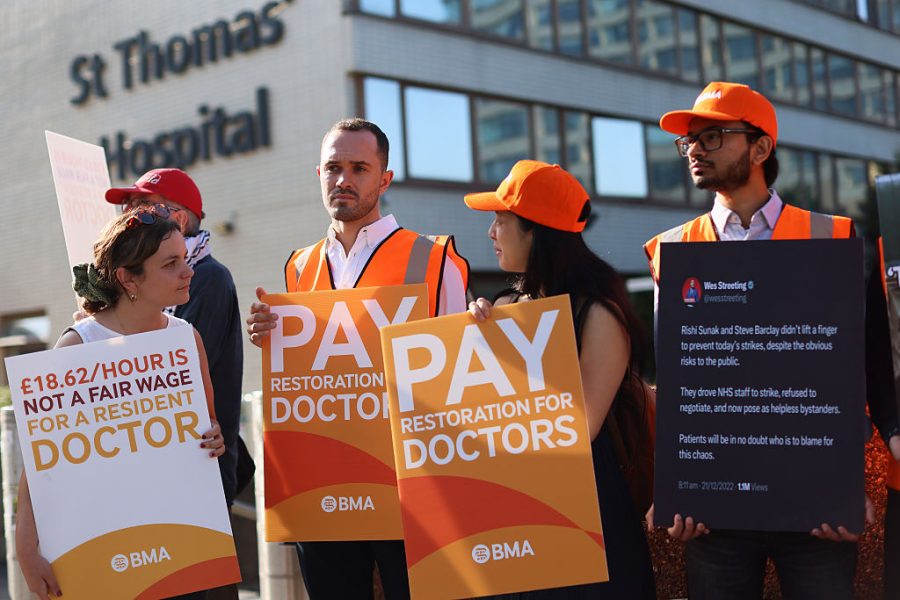In medicine, the working year begins today, as freshly qualified doctors start and others rotate to new attachments. Mismanagement means that a huge number will, unusually, be unemployed: as late as the end of July, the BMA said a third of all junior doctors had no jobs to go to in August.
Understandably, juniors are upset – so much so that fixing this catastrophe could end the strikes both amicably and affordably. Solving today’s problem offers an opportunity to make the NHS both better and cheaper. This year’s crop of unemployed doctors is a disastrous glitch. In a better-run system, unemployment could be a valuable feature.
Doctors should not be exempt from the competition of a crowded market
Historically, the barrier to getting lifelong work as a doctor has been winning a place in medical school. From then on there was competition for the most desirable roles, but work was guaranteed. We have always trained fewer doctors than we needed, filling our gaps with recruits from overseas.
The current calamity is not deliberate but the result of sustained managerial incompetence. Juniors used to compete for jobs based largely on the quality of their work – reputation mattered. That system came to be seen as unjust: the brightest kids (and not necessarily those from the most privileged backgrounds) kept outperforming. Fear of an old boy’s network – usually unjustified, in my experience – meant references were abolished as a key criterion and applications turned into an essay competition.
That, soon enough, was also deemed unfair. The same people – the brightest and best – were better at writing essays. Something had to be done to prevent the systemic bias of meritocracy, so large parts of the system were turned into a lottery – because nothing says ‘quality healthcare’ like leaving medical appointments to chance – complicated by a badly designed points system which fails to reward the best candidates.
All of this now favours overseas doctors, if only because it turns out there are quite a lot of them. If foreign doctors were consistently better, there would be a strong argument for making no change, since the NHS is not there to provide work for staff but care for patients. Yet excellent home-grown doctors are left unemployed, while we appoint others who don’t consistently match their standards. Generalisations are only true in general, but overseas doctors are more frequently subject to General Medical Council sanctions.
All of this suggests a counterintuitive solution: we should train more doctors than we need. My profession has long worked to cap its own numbers. That’s how guilds maintain their privilege, and Royal Colleges are no exceptions. Less clear is why governments should agree. An oversupply of doctors would create competition, driving up quality and pushing down wages. Beneficial oversupply, combined with genuinely merit-based competition, would mean some doctors never found work in medicine – which might be thoroughly helpful.
The emotional cost to doctors of not having a job for life would be real, but why should we be spared what is normal for others? There is no shortage of people wishing to study medicine and no shortage of people who are good enough. In the long term, competition might even be good for doctors: most of us, I suspect, really do enjoy hard work, and if we can diminish the number of our colleagues who prefer to hide from it, we’ll be happier.
Medical degrees are relatively rigorous. Arguably they’re decent preparation for a range of jobs, perhaps as helpful as literature, biology, or media studies. Graduates don’t need to practise medicine for their taxes to repay the state’s investment. Nor is it wasted money to train those who don’t make the cut in the NHS: quality control is cheaper than giving the wrong people a job for life.
The cost of training is an issue, and an expansion of medical school places would need to deal with the graft of universities and medical education experts grown comfortable from taking clinical wages for avoiding clinical work. Many doctors are strikingly keen on roles, like teaching, that spare them from seeing patients; a cohort in whom we might welcome a higher unemployment rate. The education empire has expanded hugely, yet no one seriously claims that the quality of graduating doctors has risen.
Junior doctors, in my experience, are more upset by current workforce problems than by their wages. Today’s crisis is an opportunity. Deliberately increasing competition, and making it meritocratic, would mean jobs for life were no longer guaranteed, the laziest and least competent wouldn’t get work, and the best of overseas graduates could be warmly welcomed. My profession’s bargaining power would be diminished, but that seems a price the country should cheerfully pay. Thoughtful references and face-to-face interviews could be restored. They’re a bad way of picking candidates, except that all the other ways are worse.
Today’s junior doctor unemployment is a scandal born of incompetence. With thoughtful reform, a permanent measure of selective unemployment could become a feature of efficient healthcare. We should embrace competition as a tool for better serving patients and broader society alike. Doctors should not be exempt from the competition of a crowded market – only from the unfair and counter-productive chaos they currently face.

